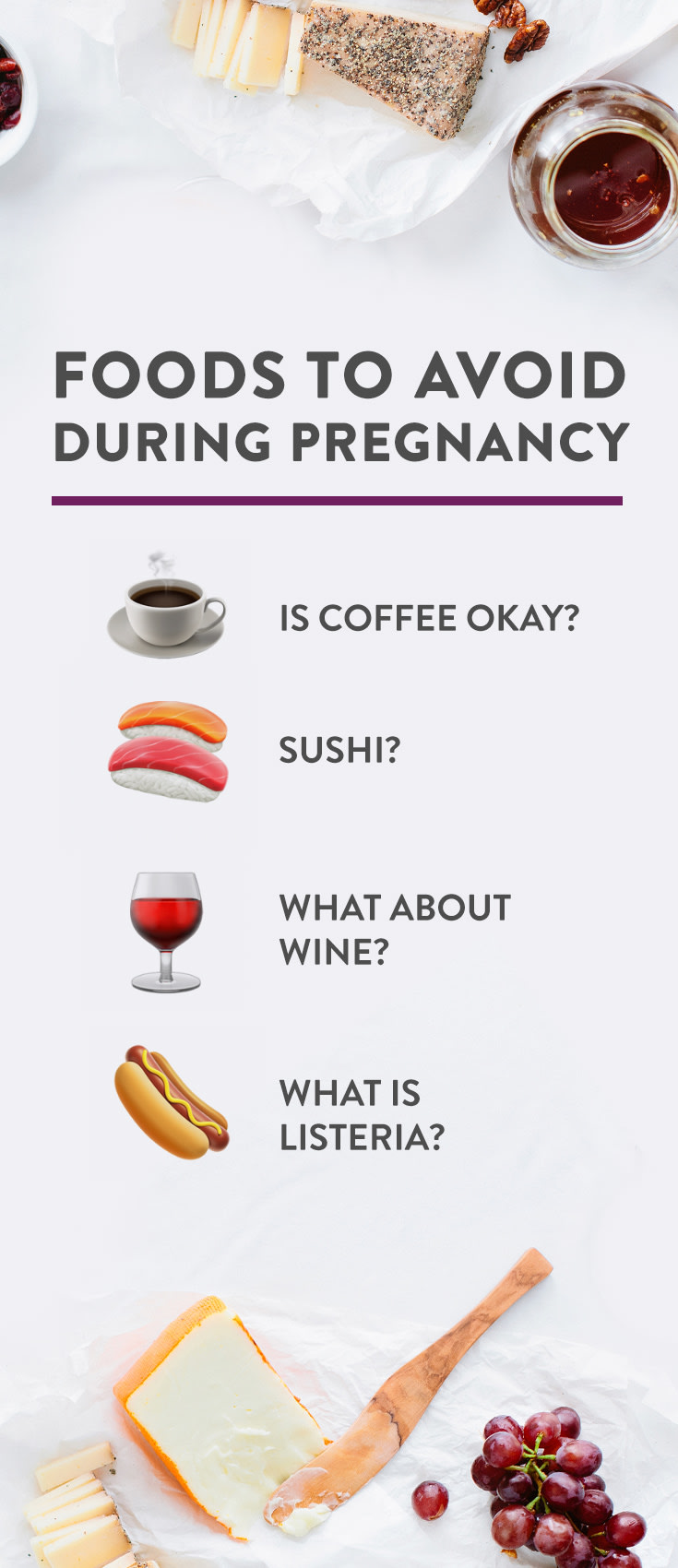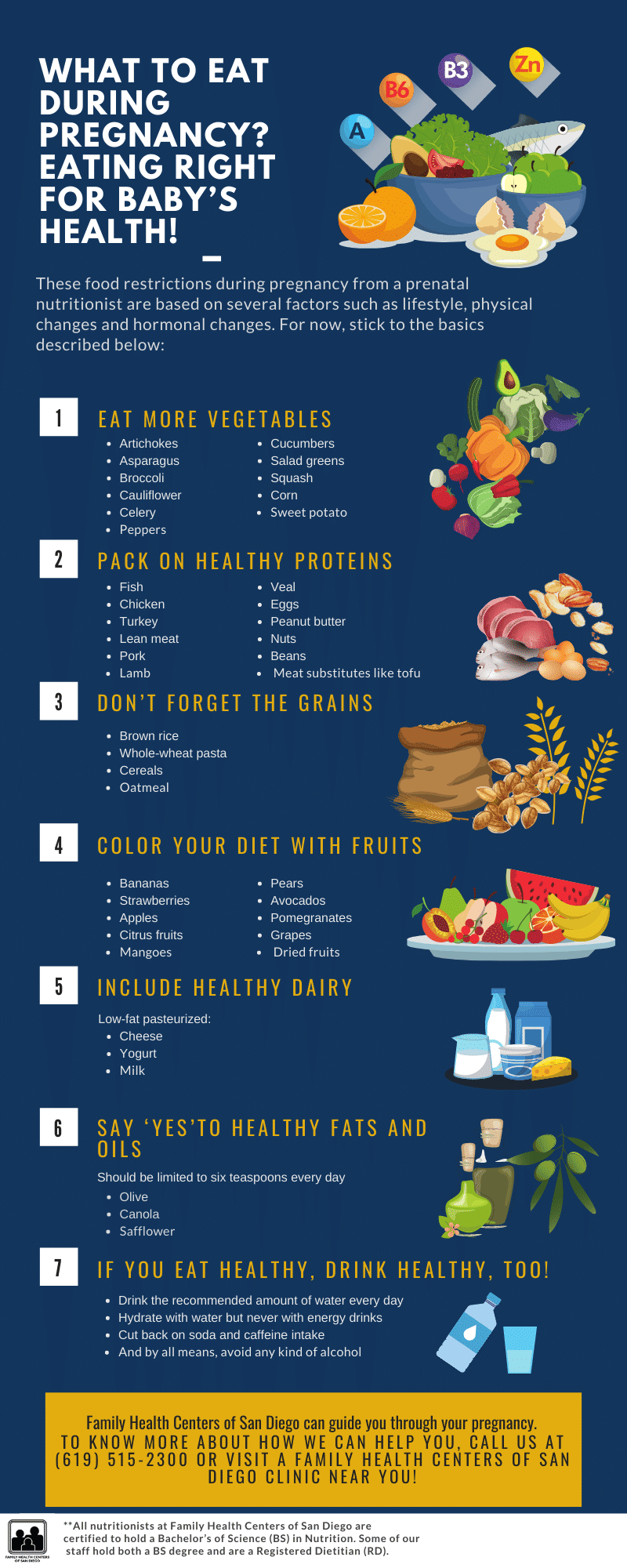Eating foods such as bananas, rice, applesauce, toast, high-protein foods like chicken and peanut butter, cold beverages, ginger, and fruits and vegetables high in water content is essential during pregnancy. It is recommended to avoid raw and undercooked seafood, eggs, and meat; sushi made with raw fish; refrigerated pâté and meat spreads; alcohol; unpasteurized milk and juices; unpasteurized kombucha; caffeinated beverages; and drinks with artificial sweeteners.
Maintaining a balanced and nutritious diet during pregnancy is crucial for both the mother’s and the baby’s wellbeing. Certain foods provide essential nutrients and promote healthy development, while others may pose risks or be difficult to digest during this sensitive time.
This article will discuss the foods that pregnant women should eat to support their health and the growth of their babies, as well as the foods they should avoid to prevent potential harm. By following these guidelines, expectant mothers can ensure a healthy and safe pregnancy.
Foods To Eat During Pregnancy
During pregnancy, choosing nutritious and safe foods for both the mother and baby’s health is essential. Some foods include fruits, vegetables, whole grains, lean proteins, and dairy products. Avoiding or limiting consumption of raw or undercooked seafood, deli meats, unpasteurized dairy, and certain types of fish high in mercury is also essential.
High-protein foods
During pregnancy, it is vital to consume foods high in protein, as they provide essential amino acids needed for the growth and development of your baby. Some high-protein food options that you can include in your diet are:
- Lean meats such as chicken, turkey, and beef
- Eggs are a great source of protein, vitamins, and minerals
- Legumes like beans, lentils, and chickpeas, which are rich in protein and fiber,
- Dairy products such as milk, yogurt, and cheese
- Nuts and seeds like almonds, cashews, walnuts, and chia seeds
Including these high-protein foods in your diet will help your baby’s development and provide you with the necessary energy and nutrients.
Grains And Whole Foods
Grains and whole foods are excellent sources of fiber, vitamins, and minerals, making them a crucial part of a healthy pregnancy diet. Opt for whole-grain options such as:
- Brown rice, which is rich in essential nutrients
- Quinoa is a complete protein source and rich in fiber
- Whole-wheat pasta, which provides sustained energy
- Oatmeal, a fiber-rich breakfast option to keep you feeling full
These grains and whole foods provide essential nutrients like folic acid, iron, and B vitamins, which are vital for the healthy development of your baby and support your wellbeing during pregnancy.
Fruits And Vegetables
Including various fruits and vegetables in your daily diet will provide you and your baby with essential vitamins, minerals, and fiber. Some nutritious options include:
| Fruits | Vegetables |
|---|---|
| Berries (strawberries, blueberries, and raspberries) | Leafy greens (spinach, kale) |
| Citrus fruits (oranges, grapefruits) | Broccoli |
| Apples | Carrots |
| Bananas | Sweet potatoes |
These fruits and vegetables are packed with antioxidants, fiber, and essential nutrients like vitamin C, which promote healthy fetal development and boost your immune system during pregnancy.
Iron-rich Foods
Iron is crucial for producing red blood cells and oxygen transportation in your body, and its demand increases during pregnancy. Including iron-rich foods in your diet can help prevent iron-deficiency anemia. Some iron-rich food options are:
- Lean red meats, such as beef and lamb
- Poultry, like chicken and turkey
- Legumes, including lentils, beans, and chickpeas
- Leafy green vegetables, such as spinach and kale
- Iron-fortified cereals and breads
Combining these iron-rich foods with vitamin C-rich sources, like citrus fruits, can enhance iron absorption. Adequate iron intake during pregnancy is essential for your and your baby’s health.
By incorporating high-protein foods, grains and whole foods, fruits and vegetables, and iron-rich foods into your pregnancy diet, you are ensuring the necessary nutrients for a healthy pregnancy and the optimal development of your baby. Remember to consult your healthcare provider for individualized advice based on your dietary needs.

Foods To Avoid During Pregnancy
Pregnancy is a crucial period when the mother must be extra cautious about her diet and lifestyle choices. Paying attention to what you eat is essential to ensuring your and your baby’s health and wellbeing. Certain foods should be strictly avoided during pregnancy due to their potential risks. Here are some top foods to steer clear of:
1. Raw And Undercooked Seafood, Eggs, And Meat
Raw and undercooked seafood, eggs, and meat should be avoided during pregnancy. These foods may contain harmful bacteria or parasites like listeria, salmonella, or toxoplasma, which can lead to food poisoning and pose a risk to the developing fetus. It is crucial to cook these foods thoroughly to eliminate any potential risks.
2. Soft Cheeses And Unpasteurized Milk Products
When pregnant, avoid consuming soft cheeses such as feta, brie, camembert, blue cheese, and unpasteurized milk products. These products might contain listeria, a bacteria that can grow at low temperatures and cause serious complications, including miscarriage and stillbirth.
3. Alcohol And Caffeinated Beverages
Alcohol and caffeinated beverages should be avoided entirely during pregnancy. Alcohol consumption can lead to fetal alcohol syndrome, causing physical and cognitive disabilities in the baby. Caffeine, found in coffee, tea, soda, and energy drinks, should also be limited, as excessive intake can increase the risk of miscarriage and low birth weight.
4. Fish Exposed To Industrial Pollutants
Some fish may contain high levels of industrial pollutants like mercury, which can be harmful during pregnancy. Fish to be avoided include shark, king mackerel, tilefish, and swordfish. Instead, choosing low-mercury alternatives like salmon, trout, and sardines is safer.
5. Raw Shellfish And Raw Eggs
Raw shellfish, such as oysters, clams, and mussels, should be avoided during pregnancy due to the risk of bacterial contamination. Raw eggs or foods containing raw eggs, like homemade mayonnaise or Caesar dressing, can also harbor salmonella. It is recommended to thoroughly cook eggs and avoid dishes containing undercooked or raw eggs.
Keeping a close eye on your diet and avoiding these potentially harmful foods can significantly contribute to a healthy and complication-free pregnancy. It is always recommended to consult with your healthcare provider for personalized dietary advice to ensure your and your baby’s wellbeing.
General Guidelines For Pregnancy Nutrition
During pregnancy, it is crucial to pay close attention to your nutritional intake to support the healthy development of your baby. A well-balanced diet that includes proteins, carbohydrates, and fats is essential for providing nutrients for you and your growing baby. Additionally, you should take certain food safety precautions to prevent any potential risks to your health and your baby’s health. Let’s explore some general guidelines for pregnancy nutrition.
Balanced Diet With Proteins, Carbohydrates, And Fats
Eating a balanced diet containing proteins, carbohydrates, and fats is vital for maintaining energy levels and providing the necessary nutrients to support your baby’s growth. Here’s a breakdown of each nutrient:
| Nutrient | Sources |
|---|---|
| Proteins | Chicken, fish, lean meats, eggs, dairy products, tofu, and legumes |
| Carbohydrates | Whole grains, fruits, vegetables, beans, and lentils |
| Fats | Avocados, nuts, seeds, olive oil, and fatty fish |
Include various foods to ensure you get a range of essential nutrients. Remember to choose lean protein sources and healthy fats, such as monounsaturated and polyunsaturated fats.
Washing Raw Fruits And Vegetables
To eliminate potentially harmful bacteria, thoroughly wash all raw fruits and vegetables before consuming them. This simple step reduces the risk of foodborne illnesses that can harm you and your baby. Rinse the produce under running water and gently scrub with a soft brush to remove any dirt or residue. It’s also advisable to peel fruits and vegetables whenever possible.
Avoiding Raw Sprouts
While sprouts may offer health benefits in a regular diet, they are best avoided during pregnancy. Raw sprouts, including alfalfa, clover, radish, and mung, have a higher risk of contamination with harmful bacteria like Salmonella and E. coli. These bacteria can cause foodborne illnesses that can be particularly harmful during pregnancy. Therefore, it’s best to opt for cooked sprouts or avoid them entirely during this sensitive period.
Limiting High Mercury Fish
Consuming fish is a great way to get essential omega-3 fatty acids, which support the development of your baby’s brain and eyes. However, some fish contain high levels of mercury, which can harm your baby’s nervous system when consumed excessively. Limit your intake of high-mercury fish such as shark, swordfish, king mackerel, and tilefish. Instead, opt for low-mercury fish like salmon, trout, shrimp, and catfish, which provide health benefits without the risks associated with high mercury levels.
By staying mindful of these general guidelines for pregnancy nutrition, you can ensure that you provide yourself and your baby with the necessary nutrients while reducing potential risks. Remember to consult your healthcare provider for personalized advice based on your specific needs during pregnancy.


Frequently Asked Questions On What Foods To Eat And What Foods To Avoid During Pregnancy
What Foods Stay Down During Pregnancy?
Foods that stay down during pregnancy include bananas, rice, applesauce, toast, chicken, peanut butter, beans, smoothies, almond milk, ginger, carbonated beverages, herbal teas, broth, and fruits and vegetables high in water content like watermelon and cucumbers. It’s important to avoid raw and undercooked seafood, eggs, meat, alcohol, unpasteurized milk, and caffeinated beverages.
Which Foods Should The Expectant Mother Reduce Or Avoid During Pregnancy?
During pregnancy, expectant mothers should reduce or avoid raw and undercooked seafood, eggs, and meat. Sushi made with raw fish should be avoided. Also, refrigerated pâté and meat spreads should be avoided. It is essential to avoid alcohol, unpasteurized milk and juices, unpasteurized kombucha, caffeinated beverages, sugary sodas, and drinks with artificial sweeteners.
What Not To Drink During Pregnancy?
Avoid drinking alcohol, unpasteurized milk and juices, unpasteurized kombucha, caffeinated beverages, sugary sodas, and drinks with artificial sweeteners during pregnancy.
What Food Do Most Pregnant Woman Eat?
Most pregnant women eat high-protein foods like fish, chicken, turkey, eggs, peanut butter, nuts, and beans. For a healthy pregnancy, they also consume whole grains like brown rice, quinoa, whole-wheat pasta, and oatmeal.
Conclusion
To ensure a healthy pregnancy, it is essential to be mindful of your food choices. Avoid raw and undercooked seafood, eggs, and meat to prevent potential foodborne illnesses. Avoid alcohol, unpasteurized milk and juices, caffeinated beverages, and sodas with artificial sweeteners.
Instead, focus on consuming high-protein foods like chicken, peanut butter, beans, grains, fruits, and vegetables. Prioritize your and your baby’s safety and well-being by making informed decisions about what to eat during this particular time.


